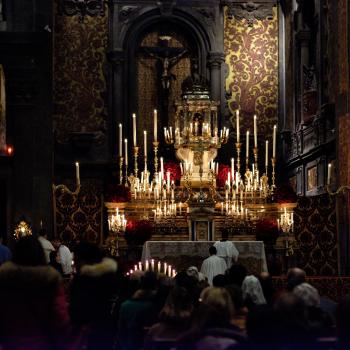Connor Wood
 Human life depends absolutely on cooperation. Unlike other animals, we don’t have big fangs, sharp claws, or leather-thick hides. Instead, we have our ability to work efficiently with each other. In modern industrial civilization, we take this flair for cooperation to the next level, depending each day on thousands of strangers to bring food to our cities, keep the roads clean, and mine coal to power our homes. And it just might be religion that makes this all possible.
Human life depends absolutely on cooperation. Unlike other animals, we don’t have big fangs, sharp claws, or leather-thick hides. Instead, we have our ability to work efficiently with each other. In modern industrial civilization, we take this flair for cooperation to the next level, depending each day on thousands of strangers to bring food to our cities, keep the roads clean, and mine coal to power our homes. And it just might be religion that makes this all possible.
Keep road-cleaning and coal-mining in mind, but first think about the following dilemma: I have a riding lawnmower and you have an old station wagon. We agree to trade. The book says they’re both worth about a thousand dollars, but of course that’s only if they’re both functional and nothing goes wrong. However, I can get the better deal if my lawnmower is actually a lemon, and it can’t cut grass or much of anything else. Then the trade favors me: I exchange a lousy lawnmower for a serviceable car. Of course, the reverse is also true – if your station wagon is actually about to croak, then you’re getting rid of a useless hunk of metal while gaining a nifty yardwork toy.
This hypothetical situation is a modern-day version of what’s called the “Prisoner’s Dilemma,” a thought experiment that balances the benefits of cheating are against the benefits of cooperation. In our lawnmower-station wagon trade, everyone loses if we both cheat, because we both wind up with broken machines. On the other hand, if we’re both being honest with each other, then we both win – I get a nice used car and you can mow your lawn in style. But the very best scenario for me is if I cheat while you trustingly cooperate. Then I get a decent car and also get rid of a broken lawnmower. I win! Mutual cooperation always beats mutual cheating, or defection, but unitary defection is the best of all.
At least, that’s what it seems like at first blush. But obviously society would never function if everyone were always trying to bilk everyone else. Somehow, we have to find ways of ensuring that most people cooperate most of the time. Researchers have long conjectured that humans have evolved “costly signaling,” or methods of demonstrating our intent to cooperate to others, in response to this need. An example is a diamond engagement ring: by spending two months’ salary on a ring, a potential fiancé is demonstrating that he’s seriously invested in his beloved. He’s put so much time, energy, and money into the relationship that his best strategy now is to go through with committing to his fiancée fully, being true, and not straying. The lucky lady can go ahead with the marriage secure in the knowledge that if her husband cheats, he’ll be losing as much as she will.
Religious studies scholar Joseph Bulbulia (Victoria University of Wellington, New Zealand) and anthropologist Richard Sosis (University of Connecticut) have long been on the forefront of a movement that links religious rituals to costly signaling theory. According to their work, complicated, painful, or onerous religious rituals such as circumcision, praying to Mecca five times daily, and getting up early on Sundays for church actually demonstrate that the worshipers are fully committed to their communities. Without such high entrance costs to religious groups, no one could ever be sure who could be relied on to stick around in difficult times.
But in new research published this month in the journal Religion, Bulbulia and Sosis suggest that the effects of religious ritual on cooperation may run even deeper than this. Specifically, the researchers argue that religious rituals help generate an overarching framework within which cooperation can function as a civilization-wide strategy.
To state the problem clearly, there isn’t any way for a costly signal to demonstrate that a factory worker 3,000 miles away actually put the right amount of attention and care into your automobile’s brake lines. Indeed, in a big, complex civilization like ours, we can’t rely on costly ritual signals, since we don’t even lay eyes on the vast majority of the people we depend on for our well-being. Instead, Bulbulia and Sosis argue that religion helps shape our evolutionary environment so that automatic cooperation becomes a winning strategy.
This process, which the authors call “niche construction,” leverages the effects of ritual on the body to make us more likely to cooperate. Long-term participation by countless individuals in rituals creates a “charismatic ecology” – a cultural system that is governed by religious norms. These norms underlie all our behavior, pushing us subtly toward cooperation and altruism and away from cheating and defection.
Two research studies bolster Bulbulia and Sosis’s claims. First, groups of research subjects were more likely to cooperate with each other after performing synchronous motions in a laboratory – in other words, after performing ritual actions at the same time and tempo. But most interestingly, the subjects were also more likely to cooperate with other subjects who hadn’t performed the rituals with them. This suggests that synchronous motion, a nearly ubiquitous feature of religious rituals, may actually prime us to be more cooperative at the bodily level.
Secondly, firewalkers in northern Spain demonstrated heart rate syncing during a firewalking ritual. This suggests that participating in a highly arousing ritual may serve to draw people’s bodies into close physiological harmony. Importantly, the friends and relatives of the firewalkers who were watching the ritual also showed heart rate syncing, although the effect was less pronounced. Finally, distant observers who did not know the ritual participants showed much less sympathetic physiological reaction. Bulbulia and Sosis interpret this finding to indicate that, although rituals affect people’s bodies in ways that make them more attuned to one another – and thus more likely to cooperate – these effects are also modulated and shaped by knowledge of the ritual experience.
This research builds on prior scholarship that strongly suggests ritual, physiology, and culture all interact with and help shape one another. Since humans help to create their own evolutionary niches, religious practices may be one of the most important tools for creating cultural frameworks within which adaptive practices like cooperation and honesty can safely function. In a free-for-all, no one can be sure that others will cooperate, and so cooperation is usually a losing strategy. In a culture deeply shaped by ritual practices, people may be able to trust others more to hold up their ends of the bargain: delivering food on time, inspecting those brake lines diligently. It’s not enough for there to be incentive to be good; we also need the tools to make being good work.











